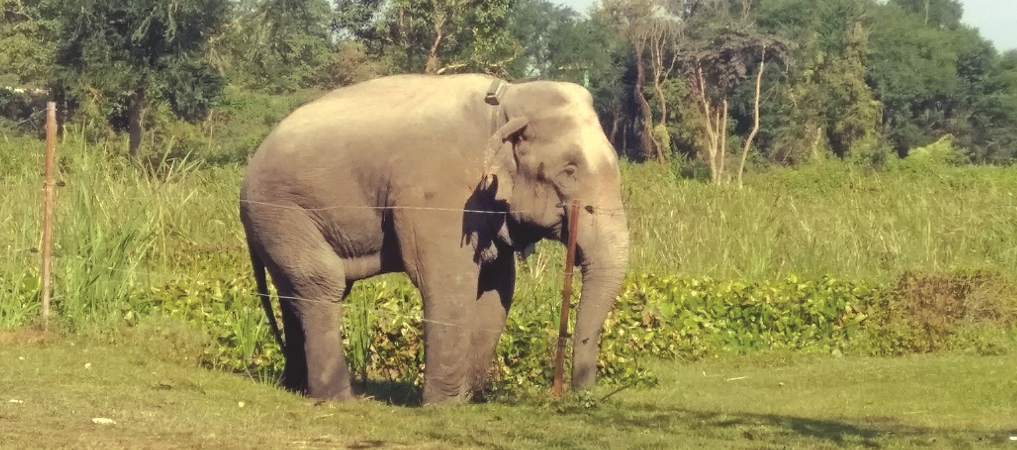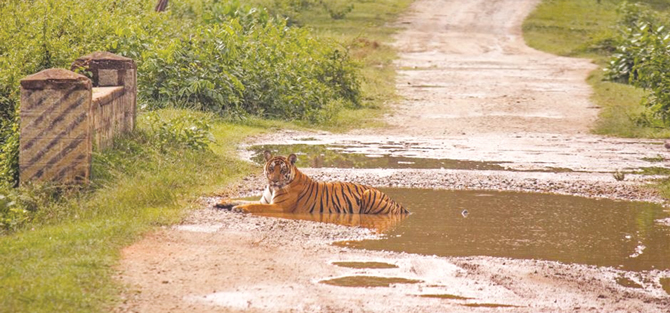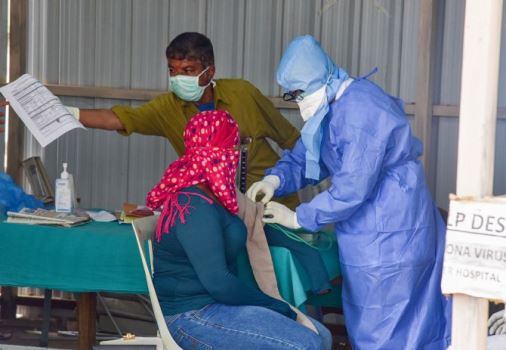How to manage a violent elephant that is killing people?

By Indira Aryal
Kathmandu, Dec. 19: A team of wildlife specialists are currently in Koshi Toppu Wildlife Reserve to rescue and treat a male wild elephant which the local people and Chief District Officer say should be killed. The reason is that the adult tusker has killed 22 people in the past two years.
In in its latest attack, the elephant, named Koshi Makuna, killed a man on December 15. Pramod Yadav, 32, of Koshi Rural Municipality-6, was killed by the elephant when he was going to irrigate his wheat field.
Now grown up aggressive, Koshi Makuna was born in the Reserve.
In the wake of the incident, a team of experts from Chitwan National Park and National Trust for Nature Conservation (NTNC) including a wildlife veterinarian have reached the reserve and started the treatment process.
According to Dr. Amir Sadaula, a wildlife veterinarian, the team darted Koshi Makuna and gave him medicine, placing him under observation. The medicine is meant to control the elephant.
Regarded as a hero of the area, Makuna has no tusk, and it sometimes moves to the settlements foraging for food, said programme officer of the NTNC Birendra Gautam.
Chief District officer of Sunsari district Phanindra Mani Pokharel said that Makuna had already killed 22 locals in the area in the past two years.
“It has become a big problem in the area and people are terrified to walk outside their houses after the Makuna turned into a killer,” he said.
Local residents, during a meeting with CDO, have decided to kill Makuna after completing the legal process but the conservation officers are opposing it. “We think that human loss is a bigger problem than killing a mad elephant, but conservation officials see this as an accident,” he added.
Citing the provision in the Local Administration Act, CDO Pokharel said that it has a provision that gives right to shoot a wild animal in the presence of CDO if the animal is violent and killer.
Local Administration Act and the National Park and Wildlife Conservation Act 2029, Section 10, Sub-section (a) has a provision to kill wild animals in the presence of local administration if they pose threat to human life.
A team of wildlife experts has started the treatment. The medicine Perphenazine given through the dart is expected control the tusker's violent behaviour.
"Let’s see what happens. But locals are not convinced about the treatment and recovery of Makuna,” said CDO Pokharel. Gautam said, “The elephant became violent because of the imbalance in its hormone, and most of the adult elephants without tusk sometimes show strange behavior,” adding, “the issue came to light after Makuna killed a local man, and it might be taken as an accident but locals are terrified after the incident.” Gautam further said that there had been no such decision whether to kill Makuna from the conservation side.
“Local residents have taken the issue to the Chief District Officer asking him to kill Makuna, but there has been no such decision so far from our side”, he said. “We are here to protect the wild animals, there could be other options before killing them, so we are treating Makuna before deciding further process.”
Wildlife expert Dr Dinesh Neupane said that killing the elephant was not a solution rather there should be a long-term solution. “If we kill one elephant now, there might be another problem in the future, so seeking for a long-term solution is the best way to keep both wild animals and human at safer side,” he said.
He said that almost every wild animal behaves aggressively during the mating time but that doesn’t mean they have to be killed.
There should be proper management on their habitat, he added. Elephant breeding centre is inside the park premises, which can be set up inside the core area of the park so that elephants do not have to come outside for mating. "There should be proper management to minimise the conflict between human and elephant. There should be an early warning system and surveillance cameras that can be installed at the main entrance of the park so that they can be tracked," he said.
Makuna, an old native elephant of the Reserve, has made a great contribution to the conservation of native elephants by keeping the Reserve's domesticated breeding, Gautam added.Currently, there are 12 to 15 wild elephants in the Reserve.
Recent News

Do not make expressions casting dout on election: EC
14 Apr, 2022
CM Bhatta says may New Year 2079 BS inspire positive thinking
14 Apr, 2022
Three new cases, 44 recoveries in 24 hours
14 Apr, 2022
689 climbers of 84 teams so far acquire permits for climbing various peaks this spring season
14 Apr, 2022
How the rising cost of living crisis is impacting Nepal
14 Apr, 2022
US military confirms an interstellar meteor collided with Earth
14 Apr, 2022
Valneva Covid vaccine approved for use in UK
14 Apr, 2022
Chair Prachanda highlights need of unity among Maoist, Communist forces
14 Apr, 2022
Ranbir Kapoor and Alia Bhatt: Bollywood toasts star couple on wedding
14 Apr, 2022
President Bhandari confers decorations (Photo Feature)
14 Apr, 2022









